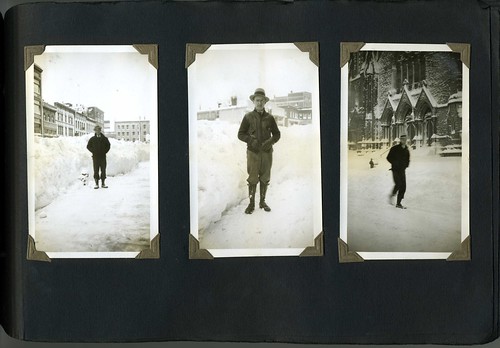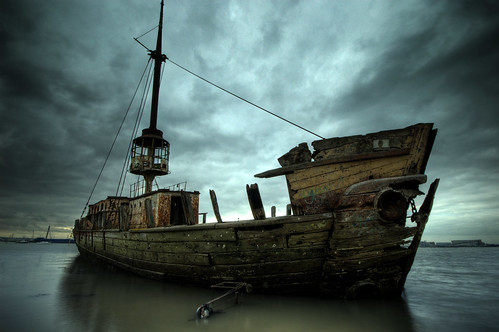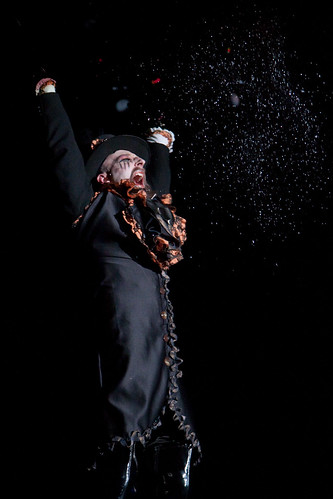The Bubble Next Time:
When financial historians look back at the last six months, they'll be hard-pressed to explain precisely why our advanced financial system suffered such a catastrophic failure. So many of the developments—a $1.2 trillion subprime-mortgage market, a $62 trillion unregulated, nontransparent credit-default-swap market, $50 billion private-equity buyouts of cyclical companies, hedge funds going public—seem, on their face, to be irrational, silly nonstarters. And yet the players pulling off these deals were lionized as geniuses, as transformational business figures. They were the Smart Money. They turned out to be the Dumb Money. How did the crown jewel of American capitalism—our financial-services industry—transform into cubic zirconia? How did a nation shift seamlessly from the dot-com bubble into a more inclusive housing and credit bubble? And, most important, how can we stop it from happening again?
Saturday, February 28, 2009
What were arcades like, Grandpa? - Boing Boing:
Well, let me tell you Billy, when I was a boy, there was an arcade at the Sheppard Centre, and we would sneak off there at lunch and after school and during spare periods and when we should have been in class. There were older teenagers, 18 or 19, who more or less lived there. One of them sold hash on the side, but mostly they just seemed to be bums. Really, really cool bums. One of them was amazingly good at Gauntlet. He'd play it all day long, spending an hour carefully honing a character to an incredibly buff state, and then he'd sell you his game for a couple bucks (the proto-goldfarmer of suburban Toronto!). We'd all crowd around and shout encouragement. The guy behind the counter, George, in his 20s, treated us like lovable scum, like you see bartenders treating the barflys in a sitcom from the era. We all knew whose initials were on the leaderboards. We were allowed to smoke in the arcade and we smoked like chimneys. All the games had volcano-crater burns from our butts. The worst offense in our universe was to pull the plug during someone's game. That always meant fights.
Well, let me tell you Billy, when I was a boy, there was an arcade at the Sheppard Centre, and we would sneak off there at lunch and after school and during spare periods and when we should have been in class. There were older teenagers, 18 or 19, who more or less lived there. One of them sold hash on the side, but mostly they just seemed to be bums. Really, really cool bums. One of them was amazingly good at Gauntlet. He'd play it all day long, spending an hour carefully honing a character to an incredibly buff state, and then he'd sell you his game for a couple bucks (the proto-goldfarmer of suburban Toronto!). We'd all crowd around and shout encouragement. The guy behind the counter, George, in his 20s, treated us like lovable scum, like you see bartenders treating the barflys in a sitcom from the era. We all knew whose initials were on the leaderboards. We were allowed to smoke in the arcade and we smoked like chimneys. All the games had volcano-crater burns from our butts. The worst offense in our universe was to pull the plug during someone's game. That always meant fights.
The Daily Dish | By Andrew Sullivan (February 28, 2009) - The View From Your Recession:
I work as a credit analyst for a big bank. I work in a call center and take calls from people who would like to lower their interest rates or increase their credit card limits. Yesterday, I talked to a man in California who for the past five years worked as a "sandwich artist" at Subway. His salary--and his only source of income? $18,000 per year. His recently foreclosed mortgage? $380,000.
The mortgage was individual, meaning no one else was legally or, more importantly, financially responsible for it. He had no down payment for the mortgage. The down payment was an additional $70,000 mortgage loan, also foreclosed. I assume he had someone living with him, who was able to help with the interest-only payments at least for a while until they reset to include the principal. But in the end he was given a total mortgage 25 times his income with no down payment.
Did he lie about his income and not provide documentation? Possibly. But the man was immediately frank with me about how much he made and what he did for a living. So assuming he was honest with the mortgage lender--who gave him the loan--as he was with me, their recklessness and greed become clear.
I work as a credit analyst for a big bank. I work in a call center and take calls from people who would like to lower their interest rates or increase their credit card limits. Yesterday, I talked to a man in California who for the past five years worked as a "sandwich artist" at Subway. His salary--and his only source of income? $18,000 per year. His recently foreclosed mortgage? $380,000.
The mortgage was individual, meaning no one else was legally or, more importantly, financially responsible for it. He had no down payment for the mortgage. The down payment was an additional $70,000 mortgage loan, also foreclosed. I assume he had someone living with him, who was able to help with the interest-only payments at least for a while until they reset to include the principal. But in the end he was given a total mortgage 25 times his income with no down payment.
Did he lie about his income and not provide documentation? Possibly. But the man was immediately frank with me about how much he made and what he did for a living. So assuming he was honest with the mortgage lender--who gave him the loan--as he was with me, their recklessness and greed become clear.
Such, Such Was Eric Blair - The New York Review of Books:
One small moment of literary history at which many Orwellians would like to have been present was an encounter in Bertorelli's restaurant in London between Orwell's biographer Bernard Crick and Orwell's widow, Sonia. Crick dared to doubt the utter truthfulness of one of Orwell's most celebrated pieces of reportage, "Shooting an Elephant." Sonia, "to the delight of other clients," according to Crick, "screamed" at him across the table, "Of course he shot a fucking elephant. He said he did. Why do you always doubt his fucking word!" The widow, you feel, was screaming for England. Because what England wants to believe about Orwell is that, having seen through the dogma and false words of political ideologies, he refuted the notion that facts are relative, flexible, or purpose-serving; further, he taught us that even if 100 percent truth is unobtainable, then 67 percent is and always will be better than 66 percent, and that even such a small percentage point is a morally nonnegotiable unit.
One small moment of literary history at which many Orwellians would like to have been present was an encounter in Bertorelli's restaurant in London between Orwell's biographer Bernard Crick and Orwell's widow, Sonia. Crick dared to doubt the utter truthfulness of one of Orwell's most celebrated pieces of reportage, "Shooting an Elephant." Sonia, "to the delight of other clients," according to Crick, "screamed" at him across the table, "Of course he shot a fucking elephant. He said he did. Why do you always doubt his fucking word!" The widow, you feel, was screaming for England. Because what England wants to believe about Orwell is that, having seen through the dogma and false words of political ideologies, he refuted the notion that facts are relative, flexible, or purpose-serving; further, he taught us that even if 100 percent truth is unobtainable, then 67 percent is and always will be better than 66 percent, and that even such a small percentage point is a morally nonnegotiable unit.
What Cooked the World's Economy?:
The basic story line so far is that we are all to blame, including homeowners who bit off more than they could chew, lenders who wrote absurd adjustable-rate mortgages, and greedy investment bankers.
Credit derivatives also figure heavily in the plot. Apologists say that these became so complicated that even Wall Street couldn't understand them and that they created "an unacceptable level of risk." Then these blowhards tell us that the bailout will pump hundreds of billions of dollars into the credit arteries and save the patient, which is the world's financial system. It will take time—maybe a year or so—but if everyone hangs in there, we'll be all right. No structural damage has been done, and all's well that ends well.
Sorry, but that's drivel. In fact, what we are living through is the worst financial scandal in history. It dwarfs 1929, Ponzi's scheme, Teapot Dome, the South Sea Bubble, tulip bulbs, you name it. Bernie Madoff? He's peanuts.
The basic story line so far is that we are all to blame, including homeowners who bit off more than they could chew, lenders who wrote absurd adjustable-rate mortgages, and greedy investment bankers.
Credit derivatives also figure heavily in the plot. Apologists say that these became so complicated that even Wall Street couldn't understand them and that they created "an unacceptable level of risk." Then these blowhards tell us that the bailout will pump hundreds of billions of dollars into the credit arteries and save the patient, which is the world's financial system. It will take time—maybe a year or so—but if everyone hangs in there, we'll be all right. No structural damage has been done, and all's well that ends well.
Sorry, but that's drivel. In fact, what we are living through is the worst financial scandal in history. It dwarfs 1929, Ponzi's scheme, Teapot Dome, the South Sea Bubble, tulip bulbs, you name it. Bernie Madoff? He's peanuts.
Friday, February 27, 2009
The Hub Review: Do MFA programs actually hurt the theatre?:
There is, however, at least one response possible, although it's cold comfort to the students involved: MFA programs keep theatre and theatrical traditions alive past the validity of their economic model. In short, students' tuition is sacrificed not merely to the bank accounts of their professors, but to the preservation of the art form. Now there are those who feel art forms simply should not outlive their economic models - it's an interesting moral quandary, though, for those who feel otherwise, whether or not to exploit the finances of students in order to perpetuate, say, large-scale productions of the classics.
But then there's Daisey's other point - that MFA programs actually harm rather than preserve theatre, by forcing those deep in MFA debt from the very profession they trained for! This argument is less easily disposed of, even though it's worth pointing out that the bills for MFAs don't actually affect the theatre audience, which would have to be the prime mover in any theatrical renaissance.
There is, however, at least one response possible, although it's cold comfort to the students involved: MFA programs keep theatre and theatrical traditions alive past the validity of their economic model. In short, students' tuition is sacrificed not merely to the bank accounts of their professors, but to the preservation of the art form. Now there are those who feel art forms simply should not outlive their economic models - it's an interesting moral quandary, though, for those who feel otherwise, whether or not to exploit the finances of students in order to perpetuate, say, large-scale productions of the classics.
But then there's Daisey's other point - that MFA programs actually harm rather than preserve theatre, by forcing those deep in MFA debt from the very profession they trained for! This argument is less easily disposed of, even though it's worth pointing out that the bills for MFAs don't actually affect the theatre audience, which would have to be the prime mover in any theatrical renaissance.
So maybe the slackers had it right after all - The Boston Globe:
Of course, it's not like we saw the crash coming. We didn't plan for this, didn't time the market. And we made some bad choices along the way: The persistent neglect of our 401(k)s, battered stock market notwithstanding, will catch up to us someday.
But in retrospect, it's clear that we did something right. We lived a smaller life, a life we could afford. And as the country rebuilds the economy, as it tries to replace it with something more sustainable than a leaning tower of subprime mortgages and consumer binging, it is time to reevaluate that much-maligned Gen X archetype: the American Slacker.
Of course, it's not like we saw the crash coming. We didn't plan for this, didn't time the market. And we made some bad choices along the way: The persistent neglect of our 401(k)s, battered stock market notwithstanding, will catch up to us someday.
But in retrospect, it's clear that we did something right. We lived a smaller life, a life we could afford. And as the country rebuilds the economy, as it tries to replace it with something more sustainable than a leaning tower of subprime mortgages and consumer binging, it is time to reevaluate that much-maligned Gen X archetype: the American Slacker.
Thursday, February 26, 2009
TEN THINGS I LEARNED ON TANNA:
—If someone tells you the reef is "flowering", it means it has neurotoxins that roll your heartrate down to 30 beats a minute and then kills you. Also, when people call a place "Shark Bay" it is not figurative—it means there are many sharks, which you can see from the shore.
—Kava is prepared by the plant being chewed by prepubescent boys, and then the pulpy mess is spat in a bowl, which is mixed with questionable water and then drunk. It tastes much like this description would imply.
—When the volcano explodes, you can see the shockwaves in the air rushing toward you in the moment before it strikes you, and then the sound that follows. It is like God has punched you, or His hand is bursting up through the earth.
—The John Frum celebrations are long: this year's lasted nine hours, with a dinner break in the middle...from morning until nearly dusk. They act out scenes, a kind of living theater, with history of the island, America and other sources intermingled into a tremendous soap opera.
—The many pieces of molten lava bursting from the volcano are the size of refrigerators and Volkswagon bugs. If one hits you the size won't be the issue, or even fire...the heat is so intense that you would disintegrate. This has happened to visitors recently.
—The Friday night celebrations, when the John Frum dance and sing all night til dawn under the deep night sky reflecting off Sulphur Bay, lit by the red glow of the volcano standing above the village like an angry God, is unforgettable. This I will carry to my grave.
—When hunting a wild pig for dinner, you have to strike the pig solidly on the side of the head to knock them down, and then beat them with the pole until dead or dazed...then someone will slit the throat and finish the job.
—A villager showed me his sacred Snoop Dogg amulet, I met people who worship Prince Philip of England as a risen god, and I talked with a man who had been taken by a documentary crew to New York City. He told me what he dreamed about, and the whole village sat together in silence, everyone naked except for penis sheaths and stone-age implements, listening to his stories of an alien land.
—I spent a day with students at a school without water or power, where every book is a rare blessing...but confounding expectation, one out of every four had a cell phone. They charge them with solar chargers, like to play snake, and IM their friends to get together.
—I learned a tremendous amount, made some lasting friendships, and reached across worlds just a bit. When I think about how alien this place seemed just weeks ago to me, I am surprised at my ignorance. It is an excellent lesson, and I am already missing this mysterious, primal island that has helped me a little to see our ordinary world in a new light.
—If someone tells you the reef is "flowering", it means it has neurotoxins that roll your heartrate down to 30 beats a minute and then kills you. Also, when people call a place "Shark Bay" it is not figurative—it means there are many sharks, which you can see from the shore.
—Kava is prepared by the plant being chewed by prepubescent boys, and then the pulpy mess is spat in a bowl, which is mixed with questionable water and then drunk. It tastes much like this description would imply.
—When the volcano explodes, you can see the shockwaves in the air rushing toward you in the moment before it strikes you, and then the sound that follows. It is like God has punched you, or His hand is bursting up through the earth.
—The John Frum celebrations are long: this year's lasted nine hours, with a dinner break in the middle...from morning until nearly dusk. They act out scenes, a kind of living theater, with history of the island, America and other sources intermingled into a tremendous soap opera.
—The many pieces of molten lava bursting from the volcano are the size of refrigerators and Volkswagon bugs. If one hits you the size won't be the issue, or even fire...the heat is so intense that you would disintegrate. This has happened to visitors recently.
—The Friday night celebrations, when the John Frum dance and sing all night til dawn under the deep night sky reflecting off Sulphur Bay, lit by the red glow of the volcano standing above the village like an angry God, is unforgettable. This I will carry to my grave.
—When hunting a wild pig for dinner, you have to strike the pig solidly on the side of the head to knock them down, and then beat them with the pole until dead or dazed...then someone will slit the throat and finish the job.
—A villager showed me his sacred Snoop Dogg amulet, I met people who worship Prince Philip of England as a risen god, and I talked with a man who had been taken by a documentary crew to New York City. He told me what he dreamed about, and the whole village sat together in silence, everyone naked except for penis sheaths and stone-age implements, listening to his stories of an alien land.
—I spent a day with students at a school without water or power, where every book is a rare blessing...but confounding expectation, one out of every four had a cell phone. They charge them with solar chargers, like to play snake, and IM their friends to get together.
—I learned a tremendous amount, made some lasting friendships, and reached across worlds just a bit. When I think about how alien this place seemed just weeks ago to me, I am surprised at my ignorance. It is an excellent lesson, and I am already missing this mysterious, primal island that has helped me a little to see our ordinary world in a new light.
Tuesday, February 10, 2009

I am writing this from the Sydney airport as I prepare for my flight to Vanuatu. Once there I will board a twin-prop airplane tomorrow morning which will take me away from Port Vila, which is remote by most people's yardstick, and to the island of Tanna...which creates new definitions of remote. I will be off the grid for the duration. There is no grid in Tanna. Some have heard of the internet, but believe it is a ghost.

I will be living with and around the people of the John Frum movement, learning about their ways, interviewing them about their beliefs, and trying not to be a nuisance. I will also try not to die in the volcano.

I got in touch with someone who hosted a cultural exchange with Tanna, and these four Ni-Vanuatu men came to New York City this fall. Here they are in a nice apartment in Manhattan, strangers in a strange land.

Now I will be the stranger. I am hoping to find these men, and ask them on Tanna what they remember of their trip to another world. What stays with them, what sticks in the craw. I hope to ask them if it ever speaks to them in their dreams as they sleep back in their own world.

I hope to represent my people well. I hope to listen, and ask questions, and know when to be silent. I hope to shed my preconceptions like a snake sheds skin, but never pretend to be objective, never let myself be voiceless. I hope to tell the truth.
I hope to be safe, and I hope to be back in a few weeks.
md
What Can You Open With a Key to the City?:
The tradition of conferring upon heroes and luminaries a key to the city dates back at least to medieval Europe. When a monarch or other ruler came to visit a town in his dominion, the city council would greet him at the gates and prepare a "joyous entrance," with flowers, dancing, singing, and so forth. The citizens would also present him with a key—probably a functional one—as a gesture of obedience but also, paradoxically, of autonomy. By offering a key, the citizens demonstrate that they have not been forced to grant the monarch entry and that they might have chosen not to. In medieval Europe, there was also a related custom of giving certain tradesmen preferred status so that they could enter a gated town on commercial business without first paying a toll.
As the New York Times pointed out Monday, there's a local tradition in New York of key-to-the-city recipients falling from grace. Baseball players Roger Clemens and Alex Rodriguez were both given keys (in June 2003 and August 2007 respectively), and both have since been accused of using performance-enhancing drugs. At least New York never honored a deposed tyrant. After donating several hundred thousand dollars to a Detroit church in 1979, Saddam Hussein received a key to the city.
The tradition of conferring upon heroes and luminaries a key to the city dates back at least to medieval Europe. When a monarch or other ruler came to visit a town in his dominion, the city council would greet him at the gates and prepare a "joyous entrance," with flowers, dancing, singing, and so forth. The citizens would also present him with a key—probably a functional one—as a gesture of obedience but also, paradoxically, of autonomy. By offering a key, the citizens demonstrate that they have not been forced to grant the monarch entry and that they might have chosen not to. In medieval Europe, there was also a related custom of giving certain tradesmen preferred status so that they could enter a gated town on commercial business without first paying a toll.
As the New York Times pointed out Monday, there's a local tradition in New York of key-to-the-city recipients falling from grace. Baseball players Roger Clemens and Alex Rodriguez were both given keys (in June 2003 and August 2007 respectively), and both have since been accused of using performance-enhancing drugs. At least New York never honored a deposed tyrant. After donating several hundred thousand dollars to a Detroit church in 1979, Saddam Hussein received a key to the city.
Parabasis: The Coburn Amendment Is A Good Argument for a High Ranking Arts Advisor:
It's actually an even more powerful argument for such a figure. In a climate where it's very difficult to get funding for the NEA, you want to find ways to fund the arts through other agencies. You want, therefore, someone with the ear of the President helping to coordinate ways in which those other agencies could be funding the arts. We don't have that right now and as a result, that $50 million not getting added to the budget hurts the arts in America even more than it has to.
It's actually an even more powerful argument for such a figure. In a climate where it's very difficult to get funding for the NEA, you want to find ways to fund the arts through other agencies. You want, therefore, someone with the ear of the President helping to coordinate ways in which those other agencies could be funding the arts. We don't have that right now and as a result, that $50 million not getting added to the budget hurts the arts in America even more than it has to.
Monday, February 09, 2009
MFA Theater Programs = Ponzi Scheme? | DENNIS BAKER LLC:
Does the teacher, that is within the academic system that charges a total sum of money that can not be paid off within the profession they are being trained for, have a responsibility to justify why this is ethical? Or do they turn the blind eye because they are getting a steady pay check?
The thrust of Daisey’s argument lies in the idea that it is very difficult for future theater artists to create theater when they are racked with debt from MFA programs. Most MFA acting programs pride themselves with the notion they are creating professional artists and not teachers. Yet many MFA actors have to look for teaching jobs when they graduate to pay off the debt from school as well as to sustain a living. We might not see the ramifications now, but like the Ponzi Scheme, this pattern of behavior will soon catch up with us.
Does the teacher, that is within the academic system that charges a total sum of money that can not be paid off within the profession they are being trained for, have a responsibility to justify why this is ethical? Or do they turn the blind eye because they are getting a steady pay check?
The thrust of Daisey’s argument lies in the idea that it is very difficult for future theater artists to create theater when they are racked with debt from MFA programs. Most MFA acting programs pride themselves with the notion they are creating professional artists and not teachers. Yet many MFA actors have to look for teaching jobs when they graduate to pay off the debt from school as well as to sustain a living. We might not see the ramifications now, but like the Ponzi Scheme, this pattern of behavior will soon catch up with us.
Lessons From the Gilded Age:
Spencer is little-read today, now that Social Darwinism—the doctrine with which his name is always, though not quite fairly, associated—looks less like the science of the future than the ideological self-justification of a rapacious and racist society. But that evening at Delmonico's, Spencer could be forgiven if he imagined himself the most brilliant human being who had ever walked the earth. As the querulous, sickly philosopher listened, William Evarts—whose career included stints as attorney general, secretary of state, and U.S. senator from New York—announced that "in theology, in psychology, in natural science, in the knowledge of individual man … we acknowledge your labors as surpassing those of any of our kind." Carl Schurz, a Civil War general and Republican reform politician, called Spencer "one of the great teachers, not merely of a school, but of civilized humanity." Henry Ward Beecher, celebrity pastor of Brooklyn's Plymouth Church, confessed that Spencer's works "have been meat and bread to me. … [I]f I had the fortune of a millionaire, and I should pour all my gold at his feet, it would be no sort of compensation compared with what I believe I owe him."
It was, in short, one of those orgies of self-congratulation in which the Victorians, in America as in England, so delighted.
Sunday, February 08, 2009
Someone I have taught in the past is upset with my position on MFA programs here.
I'm going to repeat a core assertion I made the other day from this post:
"I am speaking very clearly about the institutional choice to charge tuitions that have no relationship with the craft they are teaching. Individual teacher's complicity with this corrupt system will vary, depending on the specific institution's practices...If a teacher is teaching in an MFA program that charges a tuition its students can never pay through the craft, the onus is on the teacher to justify for his or herself how this can be ethical."
The idea that I'm equating professors with Bernie Madoff is baseless--I am talking about an institutionalized system, not a case of individual fraud. I was speaking about it as a Ponzi scheme because it is requiring future generations (and larger and larger tuitions) to pay in to keep the present system afloat. Ponzi schemes are illegal because they are created in bad faith, and are unsustainable in the long term—I'm floating the possibility that the current system shares some of these issues.
The vast majority of theater MFA programs have very little financial support compared with other type of graduate programs, and the mean tuition is much higher--NYU's Tisch School of the Arts, for example, runs about $40K a year for three years, and that is without incidentals or interest on the loans it will require. If anyone who reads this knows where there are some studies of theater MFA program costs nationwide, post or email me.
I'm specifically concerned with theater training MFAs, and what effect that system is having on the theatrical ecosystem. I don't believe the writing MFA system is terribly relevant, as the connection between what you're taught and how it can be used in direct practice is very different than theater—someone else with more experience can speak to that relationship.
I'm also not talking about the efficacy or lack thereof in these programs, nor am I talking about whether they make "clones" of the artists or anything of that sort. There are great programs and terrible programs I am sure--I am only specifically concerned, in these arguments, with the effect that high tuition is having on theatrical training.
In the post Allison states, and a number of people have said the same:
"I'm angry at Daisey for slandering arts professors in this manner."
There's no slander--it is up to each professor to be aware of the tuition their institution charges, and understand their role in that system. In the case of theater I believe a strong case can be made that the huge footprint of these MFA theater programs is saddling young artists with crushing debt that weakens the future of the form. If you are complicit in that system I believe you have a responsibility to reconcile those facts, and I think it would be healthy if people did their reconciling in public, because then we can actually have some public dialogue about it.
"None of us is owed a living, regardless of our profession. We are not promised top-flight jobs, nor are we owed even subsistence-level salaries. Such is the promise and pitfall of a capitalist society."
I would argue that perhaps one of the largest pitfall network effects of a capitalist society is the tragedy of the commons—in this case it is possible that a universally needed resource (future artists) is being exploited to ensure economic stability for the system today. By telling theater artists today that they must have training, and then making that training out of context to the industry they will be practicing their craft in we hurt the art form as a whole.
I've had some fantastic teachers in my life, and I love teaching myself. That doesn't absolve me or anyone else of the responsibility to call out a broken system for its problems.
I'm going to repeat a core assertion I made the other day from this post:
"I am speaking very clearly about the institutional choice to charge tuitions that have no relationship with the craft they are teaching. Individual teacher's complicity with this corrupt system will vary, depending on the specific institution's practices...If a teacher is teaching in an MFA program that charges a tuition its students can never pay through the craft, the onus is on the teacher to justify for his or herself how this can be ethical."
The idea that I'm equating professors with Bernie Madoff is baseless--I am talking about an institutionalized system, not a case of individual fraud. I was speaking about it as a Ponzi scheme because it is requiring future generations (and larger and larger tuitions) to pay in to keep the present system afloat. Ponzi schemes are illegal because they are created in bad faith, and are unsustainable in the long term—I'm floating the possibility that the current system shares some of these issues.
The vast majority of theater MFA programs have very little financial support compared with other type of graduate programs, and the mean tuition is much higher--NYU's Tisch School of the Arts, for example, runs about $40K a year for three years, and that is without incidentals or interest on the loans it will require. If anyone who reads this knows where there are some studies of theater MFA program costs nationwide, post or email me.
I'm specifically concerned with theater training MFAs, and what effect that system is having on the theatrical ecosystem. I don't believe the writing MFA system is terribly relevant, as the connection between what you're taught and how it can be used in direct practice is very different than theater—someone else with more experience can speak to that relationship.
I'm also not talking about the efficacy or lack thereof in these programs, nor am I talking about whether they make "clones" of the artists or anything of that sort. There are great programs and terrible programs I am sure--I am only specifically concerned, in these arguments, with the effect that high tuition is having on theatrical training.
In the post Allison states, and a number of people have said the same:
"I'm angry at Daisey for slandering arts professors in this manner."
There's no slander--it is up to each professor to be aware of the tuition their institution charges, and understand their role in that system. In the case of theater I believe a strong case can be made that the huge footprint of these MFA theater programs is saddling young artists with crushing debt that weakens the future of the form. If you are complicit in that system I believe you have a responsibility to reconcile those facts, and I think it would be healthy if people did their reconciling in public, because then we can actually have some public dialogue about it.
"None of us is owed a living, regardless of our profession. We are not promised top-flight jobs, nor are we owed even subsistence-level salaries. Such is the promise and pitfall of a capitalist society."
I would argue that perhaps one of the largest pitfall network effects of a capitalist society is the tragedy of the commons—in this case it is possible that a universally needed resource (future artists) is being exploited to ensure economic stability for the system today. By telling theater artists today that they must have training, and then making that training out of context to the industry they will be practicing their craft in we hurt the art form as a whole.
I've had some fantastic teachers in my life, and I love teaching myself. That doesn't absolve me or anyone else of the responsibility to call out a broken system for its problems.
Saturday, February 07, 2009
Scrappy Jack's World-Wide Theatricals and Dime Museum: more for the pod people:
The old MFA question came up, of course. Those who've been reading this blog know my take on this: don't waste your time and tens of thousands of dollars, get out there and fail in public. It's harsh, but those experiences are lessons you will never forget, not classes you will sleep through.
And on a deeper level, studying directing or acting or playwriting in an academic environment seems to reinforce some dangerous assumptions.
In a class, you are working for the approval of one person, your teacher, right? You want to get that A. So then you go out into the world and you start working for someone else's approval, a lead critic, say.
In a classroom environment, there's always the unspoken understanding that there is a right answer, a right way and a wrong way. So you get loaded up with all of this received wisdom and unthinking tradition and are subtly or not so subtly discouraged from working from an initial, original impulse.
Where else is anything interesting, innovative or worthwhile going to come from except an initial, original impulse?
The old MFA question came up, of course. Those who've been reading this blog know my take on this: don't waste your time and tens of thousands of dollars, get out there and fail in public. It's harsh, but those experiences are lessons you will never forget, not classes you will sleep through.
And on a deeper level, studying directing or acting or playwriting in an academic environment seems to reinforce some dangerous assumptions.
In a class, you are working for the approval of one person, your teacher, right? You want to get that A. So then you go out into the world and you start working for someone else's approval, a lead critic, say.
In a classroom environment, there's always the unspoken understanding that there is a right answer, a right way and a wrong way. So you get loaded up with all of this received wisdom and unthinking tradition and are subtly or not so subtly discouraged from working from an initial, original impulse.
Where else is anything interesting, innovative or worthwhile going to come from except an initial, original impulse?
Washington Wire - WSJ.com : Senate Passes 'Mob Museum' Prohibition in Stimulus:
Coburn’s amendment specifically prohibits the use of stimulus funds for items including a “casino or other gambling establishment, aquarium, zoo, golf course, swimming pool, stadium, community park, museum, theater, art center, and highway beautification project.”
The amendment passed by a 73-24 vote.
Coburn’s amendment specifically prohibits the use of stimulus funds for items including a “casino or other gambling establishment, aquarium, zoo, golf course, swimming pool, stadium, community park, museum, theater, art center, and highway beautification project.”
The amendment passed by a 73-24 vote.
Friday, February 06, 2009
The once and future e-book: on reading in the digital age - Ars Technica:
If you remain unconvinced, here's one final exercise, in the grand tradition of a particular family of Internet analogies. Take all of your arguments against the inevitability of e-books and substitute the word "horse" for "book" and the word "car" for "e-book." Here are a few examples to whet your appetite for the (really) inevitable debate in the discussion section at the end of this article.
"Books will never go away." True! Horses have not gone away either.
"Books have advantages over e-books that will never be overcome." True! Horses can travel over rough terrain that no car can navigate. Paved roads don't go everywhere, nor should they.
"Books provide sensory/sentimental/sensual experiences that e-books can't match." True! Cars just can't match the experience of caring for and riding a horse: the smells, the textures, the sensations, the companionship with another living being.
Lather, rinse, repeat. Did you ride a horse to work today? I didn't. I'm sure plenty of people swore they would never ride in or operate a "horseless carriage"—and they never did! And then they died.
If you remain unconvinced, here's one final exercise, in the grand tradition of a particular family of Internet analogies. Take all of your arguments against the inevitability of e-books and substitute the word "horse" for "book" and the word "car" for "e-book." Here are a few examples to whet your appetite for the (really) inevitable debate in the discussion section at the end of this article.
"Books will never go away." True! Horses have not gone away either.
"Books have advantages over e-books that will never be overcome." True! Horses can travel over rough terrain that no car can navigate. Paved roads don't go everywhere, nor should they.
"Books provide sensory/sentimental/sensual experiences that e-books can't match." True! Cars just can't match the experience of caring for and riding a horse: the smells, the textures, the sensations, the companionship with another living being.
Lather, rinse, repeat. Did you ride a horse to work today? I didn't. I'm sure plenty of people swore they would never ride in or operate a "horseless carriage"—and they never did! And then they died.
One Man’s Blanche DuBois Is a University’s Infringement - NYTimes.com:
The University of the South, which owns the intellectual property rights for Williams’s “Streetcar Named Desire,” has threatened legal action to stop performances of the one-man show “Blanche Survives Katrina in a FEMA Trailer Named Desire,” which is scheduled to run through March 15 at SoHo Playhouse.
Lawyers for the university, in Sewanee, Tenn., initially tried to quash the production in September, arguing in a letter to Mr. Rosenthal that his play and performances were “infringements on the university’s valuable intellectual property rights.”
The idea that a UNIVERSITY, of all places, is responsible for this atrocious and petty cease-and-desist harassment in order to silence art is absolutely disgusting. Pathetic assclowns.
The University of the South, which owns the intellectual property rights for Williams’s “Streetcar Named Desire,” has threatened legal action to stop performances of the one-man show “Blanche Survives Katrina in a FEMA Trailer Named Desire,” which is scheduled to run through March 15 at SoHo Playhouse.
Lawyers for the university, in Sewanee, Tenn., initially tried to quash the production in September, arguing in a letter to Mr. Rosenthal that his play and performances were “infringements on the university’s valuable intellectual property rights.”
The idea that a UNIVERSITY, of all places, is responsible for this atrocious and petty cease-and-desist harassment in order to silence art is absolutely disgusting. Pathetic assclowns.
Thursday, February 05, 2009
Remembering How To Cope:
Trudging around snowy London, it was impossible to escape another thought: Surely what's true of the weather is also true of other kinds of unexpected changes. For example, people who no longer remember slow economic growth might not cope at all well with a severe recession. In London, it hasn't snowed much for 18 years, so no one owns a shovel—and if they do, they don't know how to use it. In the United States, the economy hasn't really collapsed since 1929, so no one knows how to save string and tinfoil—and if they did, they wouldn't know what to do with them. A whole set of skills, from cooking with leftovers to recycling bottles (not because it's green, but because it's cheap), has been lost during two generations of prosperity, in much the same way as the British have forgotten how to drive their cars through patches of slush. The last time I went to have some shoes re-soled in Washington, the cobbler told me he wasn't going to be in business much longer, so low had the demand for his services shrunk. Does anyone know how to repair toasters anymore? What about TV sets?
Trudging around snowy London, it was impossible to escape another thought: Surely what's true of the weather is also true of other kinds of unexpected changes. For example, people who no longer remember slow economic growth might not cope at all well with a severe recession. In London, it hasn't snowed much for 18 years, so no one owns a shovel—and if they do, they don't know how to use it. In the United States, the economy hasn't really collapsed since 1929, so no one knows how to save string and tinfoil—and if they did, they wouldn't know what to do with them. A whole set of skills, from cooking with leftovers to recycling bottles (not because it's green, but because it's cheap), has been lost during two generations of prosperity, in much the same way as the British have forgotten how to drive their cars through patches of slush. The last time I went to have some shoes re-soled in Washington, the cobbler told me he wasn't going to be in business much longer, so low had the demand for his services shrunk. Does anyone know how to repair toasters anymore? What about TV sets?
The Guardian's arts blog is following the MFA discussion I began last week—you can read the post on it here. I must address this statement Chris Wilkinson makes:
"Loughlin's passion demonstrates that Daisey's cynicism about the motivation of many theatre teachers is unfair."
It might, if that were the thrust of what I was saying, but it is not. I am speaking very clearly about the institutional choice to charge tuitions that have no relationship with the craft they are teaching. Individual teacher's complicity with this corrupt system will vary, depending on the specific institution's practices.
Mr. Loughlin's passion, which I commented on previously, demonstrates one thing: that Mr. Loughlin is passionate, which is tremendous and commendable. If a teacher is teaching in an MFA program that charges a tuition its students can never pay through the craft, the onus is on the teacher to justify for his or herself how this can be ethical. Mr. Loughlin understands that, and it's why he published a clear statement about how he works, how he practices his work, and why.
But Daisey is absolutely right that colleges both in America and over here are accepting many students who will never make a career out of acting: these institutions may be responding to the demand they get from people wanting to train, but they take no account of the fact that there simply is not a comparable demand for that number of performers in the industry itself.
I would argue they are also creating a demand, by creating a future generation of theater teachers—a kind of Ponzi scheme, if you will.
What is more depressing is that while Loughlin is right to argue that an education is an end in itself, most people who train as actors see it explicitly as a means to a theatrical career. When the acting doesn't work out, they quickly find that their degree is not valued particularly highly by anyone else.
If teachers of theater at large looked within themselves and held themselves to account, I would be fascinated to see what kind of answers they would give to the state of things. They are, on the whole, silent—and I believe this silence is born out of shame and complicity.
"Loughlin's passion demonstrates that Daisey's cynicism about the motivation of many theatre teachers is unfair."
It might, if that were the thrust of what I was saying, but it is not. I am speaking very clearly about the institutional choice to charge tuitions that have no relationship with the craft they are teaching. Individual teacher's complicity with this corrupt system will vary, depending on the specific institution's practices.
Mr. Loughlin's passion, which I commented on previously, demonstrates one thing: that Mr. Loughlin is passionate, which is tremendous and commendable. If a teacher is teaching in an MFA program that charges a tuition its students can never pay through the craft, the onus is on the teacher to justify for his or herself how this can be ethical. Mr. Loughlin understands that, and it's why he published a clear statement about how he works, how he practices his work, and why.
But Daisey is absolutely right that colleges both in America and over here are accepting many students who will never make a career out of acting: these institutions may be responding to the demand they get from people wanting to train, but they take no account of the fact that there simply is not a comparable demand for that number of performers in the industry itself.
I would argue they are also creating a demand, by creating a future generation of theater teachers—a kind of Ponzi scheme, if you will.
What is more depressing is that while Loughlin is right to argue that an education is an end in itself, most people who train as actors see it explicitly as a means to a theatrical career. When the acting doesn't work out, they quickly find that their degree is not valued particularly highly by anyone else.
If teachers of theater at large looked within themselves and held themselves to account, I would be fascinated to see what kind of answers they would give to the state of things. They are, on the whole, silent—and I believe this silence is born out of shame and complicity.
DesignAday - Truism:
“Broken gets fixed. Shoddy lasts forever.”
One of the developers I work with said this after I complained about a lingering issue in one of our products. It rings true. When deadlines are tight, and there is more work to get done than there are developers or hours in the schedule, it’s not the squeaky wheel, but the jammed one that gets the grease. The lesson, then, is to make sure it gets done right the first time. You never know when you’ll have the opportunity to revisit it.
“Broken gets fixed. Shoddy lasts forever.”
One of the developers I work with said this after I complained about a lingering issue in one of our products. It rings true. When deadlines are tight, and there is more work to get done than there are developers or hours in the schedule, it’s not the squeaky wheel, but the jammed one that gets the grease. The lesson, then, is to make sure it gets done right the first time. You never know when you’ll have the opportunity to revisit it.
Tuesday, February 03, 2009
Monday, February 02, 2009
Sunday, February 01, 2009
I spent three days looking for someone who doesn't think the world's going to hell:
Armed with a notebook, Blackberry, flip camera, and laptop, I mounted a 72-hour effort to locate an optimistic CEO. A PriceWaterhouseCoopers survey of CEOs, released on the eve of the World Economic Forum, found that only one in five (21 percent) was confident their revenues would rise in the coming year. In theory, some of that 21 percent should have been here.
Yet many CEOs bore the harrowed looks of survivors of the Donner Party. Once they trickled in, many having endured the indignity of flying commercial for the first time in years, they were treated to an avalanche of doomsaying. Alarmists, from hedge-fund manager George Soros to historian Niall Ferguson, spun elaborate tales of catastrophe. Ferguson boldly concluded that the United States was destined for a decade of extremely lame growth.
Economists were universally downbeat, which isn't totally surprising. (They don't call economics the dismal science for nothing.) Those who had successfully predicted the debacle, like Nouriel Roubini, New York University's Dr. Doom, were elevated to prime speaking slots. Last year, the hot topics were sustainability and decoupling—the notion that developed markets could boom even if the United States stalled. This year, failure and depression were the chief subject of discussion.
Armed with a notebook, Blackberry, flip camera, and laptop, I mounted a 72-hour effort to locate an optimistic CEO. A PriceWaterhouseCoopers survey of CEOs, released on the eve of the World Economic Forum, found that only one in five (21 percent) was confident their revenues would rise in the coming year. In theory, some of that 21 percent should have been here.
Yet many CEOs bore the harrowed looks of survivors of the Donner Party. Once they trickled in, many having endured the indignity of flying commercial for the first time in years, they were treated to an avalanche of doomsaying. Alarmists, from hedge-fund manager George Soros to historian Niall Ferguson, spun elaborate tales of catastrophe. Ferguson boldly concluded that the United States was destined for a decade of extremely lame growth.
Economists were universally downbeat, which isn't totally surprising. (They don't call economics the dismal science for nothing.) Those who had successfully predicted the debacle, like Nouriel Roubini, New York University's Dr. Doom, were elevated to prime speaking slots. Last year, the hot topics were sustainability and decoupling—the notion that developed markets could boom even if the United States stalled. This year, failure and depression were the chief subject of discussion.
A really great post by Tom Loughlin in response (in part) to my posting the other day about MFA programs.
First, I have to say that I regret that I may have inadvertently depressed Mr. Loughlin, though I'm hoping that was more due to his reading this Stanly Fish post, which is deeply depressing and somewhat infuriatingly throws its hands up and surrenders the future of higher education.
Mr. Loughlin offers a wonderful summation of why he teaches, and it's great. Leonard Jacobs makes the point that his teachers from the past, and many other teachers of the arts, aren't writing spirited defenses like this.
Mr. Loughlin ends his post this way:
Then, perhaps, some defense needs to be mounted for the purpose of educational theatre. Not the current model of educational theatre, mind you. I have been critical of that on several occasions before Mr. Daisey raised the question. What needs defending is the value of educational theatre, and the potential it offers to all theatre artists if only we can re-shape the model.
I couldn't agree more: I must be clear that I have always been in favor of the full education and craft-based training of young artists—I would not be who I am today without that gift.
What I am specifically questioning is the current model, it's onerous costs to the artists, and its unreasonable fiscal expectations that actually make it harder for artists to survive.
First, I have to say that I regret that I may have inadvertently depressed Mr. Loughlin, though I'm hoping that was more due to his reading this Stanly Fish post, which is deeply depressing and somewhat infuriatingly throws its hands up and surrenders the future of higher education.
Mr. Loughlin offers a wonderful summation of why he teaches, and it's great. Leonard Jacobs makes the point that his teachers from the past, and many other teachers of the arts, aren't writing spirited defenses like this.
Mr. Loughlin ends his post this way:
Then, perhaps, some defense needs to be mounted for the purpose of educational theatre. Not the current model of educational theatre, mind you. I have been critical of that on several occasions before Mr. Daisey raised the question. What needs defending is the value of educational theatre, and the potential it offers to all theatre artists if only we can re-shape the model.
I couldn't agree more: I must be clear that I have always been in favor of the full education and craft-based training of young artists—I would not be who I am today without that gift.
What I am specifically questioning is the current model, it's onerous costs to the artists, and its unreasonable fiscal expectations that actually make it harder for artists to survive.
Subscribe to:
Comments (Atom)















![Happy birthday my fairy... [Léane - 11 ans]](http://farm4.static.flickr.com/3302/3262289277_726d866cbf.jpg)























